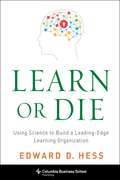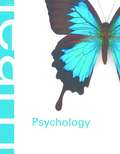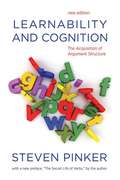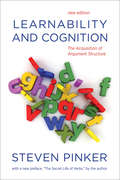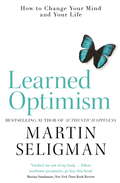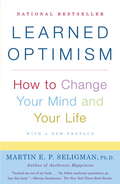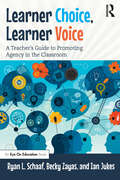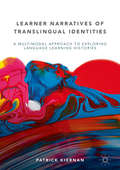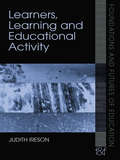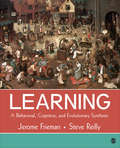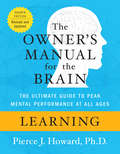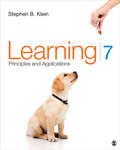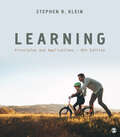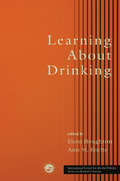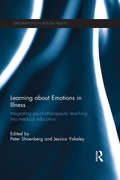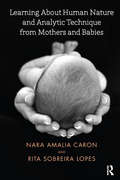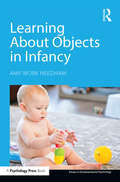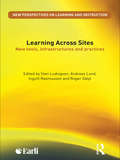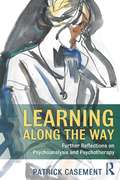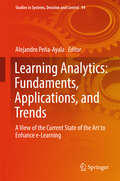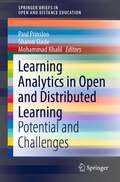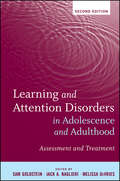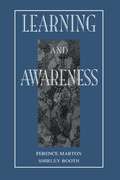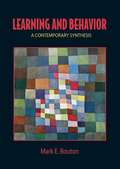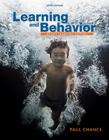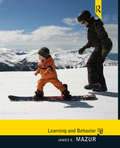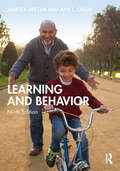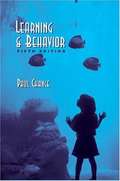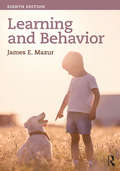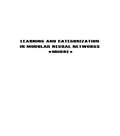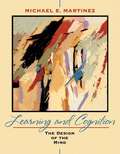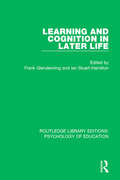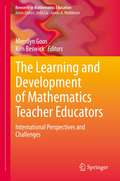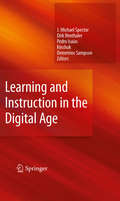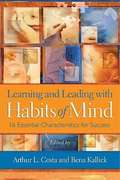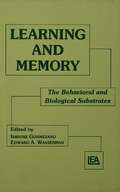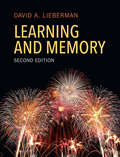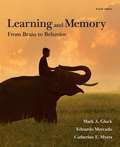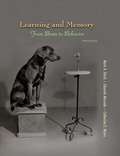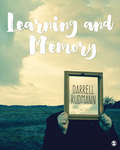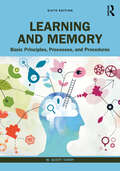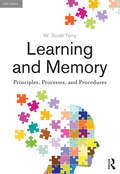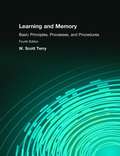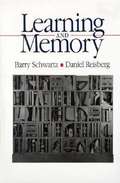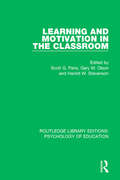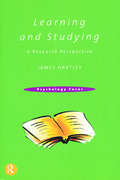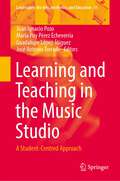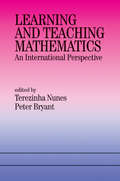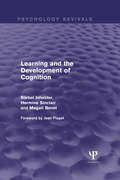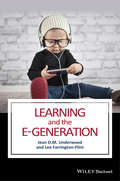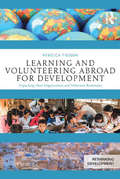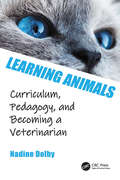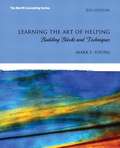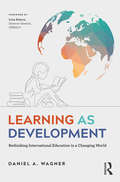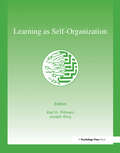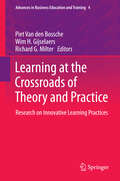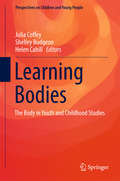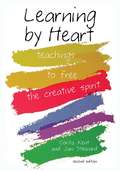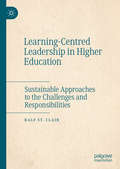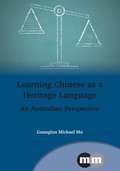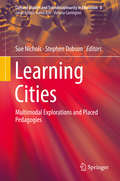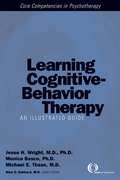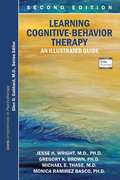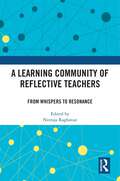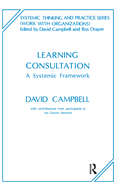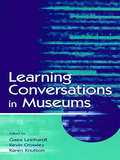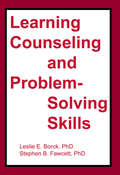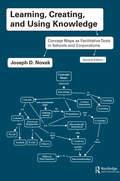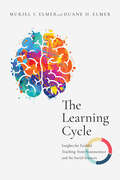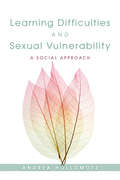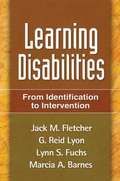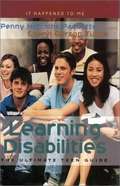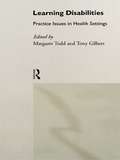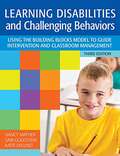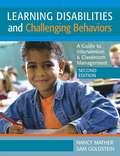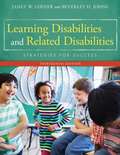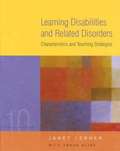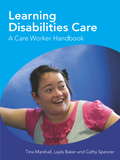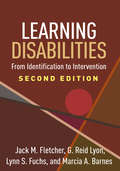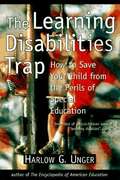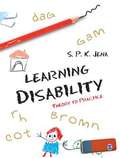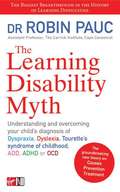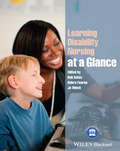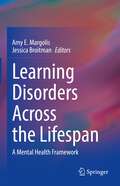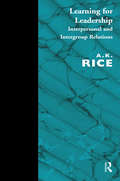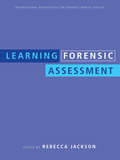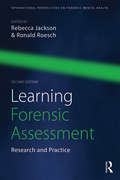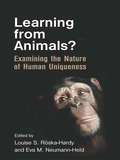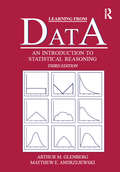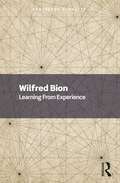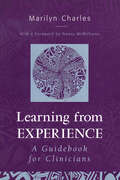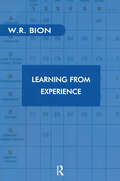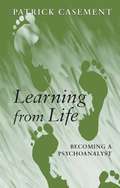- Table View
- List View
Learn or Die: Using Science to Build a Leading-Edge Learning Organization (Columbia Business School Publishing)
by Edward HessTo compete with today's increasing globalization and rapidly evolving technologies, individuals and organizations must take their ability to learn—the foundation for continuous improvement, operational excellence, and innovation—to a much higher level. In Learn or Die, Edward D. Hess combines recent advances in neuroscience, psychology, behavioral economics, and education with key research on high-performance businesses to create an actionable blueprint for becoming a leading-edge learning organization. Learn or Die examines the process of learning from an individual and an organizational standpoint. From an individual perspective, the book discusses the cognitive, emotional, motivational, attitudinal, and behavioral factors that promote better learning. Organizationally, Learn or Die focuses on the kinds of structures, culture, leadership, employee learning behaviors, and human resource policies that are necessary to create an environment that enables critical and innovative thinking, learning conversations, and collaboration. The volume also provides strategies to mitigate the reality that humans can be reflexive, lazy thinkers who seek confirmation of what they believe to be true and affirmation of their self-image. Exemplar learning organizations discussed include the secretive Bridgewater Associates, LP; Intuit, Inc.; United Parcel Service (UPS); W. L. Gore & Associates; and IDEO.
Learn Psychology
by Kenneth Carter Colleen SeifertLearn Psychology offers a comprehensive yet accessible presentation of psychology principles, research and theory. Each chapter is carefully structured to cover the topics and concepts of a standard introductory psychology course with associated learning objectives and assessments. Multiple influences are discussed at the end of each chapter wrapping up the chapter presentation. With Learn Psychology, students will find an engaging writing style supported by a pedagogical approach that invites critical analysis, all while building a deeper knowledge of psychology.
Learnability and Cognition: The Acquisition of Argument Structure (new edition)
by Steven PinkerBefore Steven Pinker wrote bestsellers on language and human nature, he wrote severaltechnical monographs on language acquisition that have become classics in cognitive science. Learnability and Cognition, first published in 1989, brought together two bigtopics: how do children learn their mother tongue, and how does the mind represent basic categoriesof meaning such as space, time, causality, agency, and goals? The stage for this synthesis was setby the fact that when children learn a language, they come to make surprisingly subtle distinctions:pour water into the glass and fill the glass with water soundnatural, but pour the glass with water and fill water into theglass sound odd. How can this happen, given that children are not reliably corrected foruttering odd sentences, and they don't just parrot back the correct ones they hear from theirparents? Pinker resolves this paradox with a theory of how children acquire the meaning and uses ofverbs, and explores that theory's implications for language, thought, and the relationship betweenthem. As Pinker writes in a new preface, "The Secret Life of Verbs," thephenomena and ideas he explored in this book inspired his 2007 bestseller The Stuff ofThought: Language as a Window into Human Nature. These technical discussions, he notes,provide insight not just into language acquisition but into literary metaphor, scientificunderstanding, political discourse, and even the conceptions of sexuality that go intoobscenity.
Learnability and Cognition, new edition: The Acquisition of Argument Structure (Learning, Development, and Conceptual Change)
by Steven PinkerA classic book about language acquisition and conceptual structure, with a new preface by the author, "The Secret Life of Verbs."Before Steven Pinker wrote bestsellers on language and human nature, he wrote several technical monographs on language acquisition that have become classics in cognitive science. Learnability and Cognition, first published in 1989, brought together two big topics: how do children learn their mother tongue, and how does the mind represent basic categories of meaning such as space, time, causality, agency, and goals? The stage for this synthesis was set by the fact that when children learn a language, they come to make surprisingly subtle distinctions: pour water into the glass and fill the glass with water sound natural, but pour the glass with water and fill water into the glass sound odd. How can this happen, given that children are not reliably corrected for uttering odd sentences, and they don't just parrot back the correct ones they hear from their parents? Pinker resolves this paradox with a theory of how children acquire the meaning and uses of verbs, and explores that theory's implications for language, thought, and the relationship between them.As Pinker writes in a new preface, "The Secret Life of Verbs," the phenomena and ideas he explored in this book inspired his 2007 bestseller The Stuff of Thought: Language as a Window into Human Nature. These technical discussions, he notes, provide insight not just into language acquisition but into literary metaphor, scientific understanding, political discourse, and even the conceptions of sexuality that go into obscenity.
Learned Optimism: How to Change Your Mind and Your Life
by Martin SeligmanFrom the bestselling author of Authentic HappinessKnown as the father of the science of positive psychology, Martin E.P. Seligman draws on more than twenty years of clinical research to demonstrate how optimism enhances the quality of life, and how anyone can learn to practice it. Offering many simple techniques, Dr. Seligman explains how to break an 'I give up' habit, develop a more constructive explanatory style for interpreting your behaviour, and experience the benefits of a more positive interior dialogue. These skills can help break up depression, boost your immune system, better develop your potential, and make you happier. With generous additional advice on how to encourage optimistic behaviour at school, at work and in children, Learned Optimism is both profound and practical, making it highly valuable for every phase of life.
Learned Optimism: How to Change Your Mind and Your Life
by Martin E. SeligmanKnown as the father of the new science of positive psychology, Martin E.P. Seligman draws on more than twenty years of clinical research to demonstrate how optimism enhances the quality of life, and how anyone can learn to practice it. Offering many simple techniques, Dr. Seligman explains how to break an "I-give-up" habit, develop a more constructive explanatory style for interpreting your behavior, and experience the benefits of a more positive interior dialogue. These skills can help break up depression, boost your immune system, better develop your potential, and make you happier. With generous additional advice on how to encourage optimistic behavior at school, at work and in children, Learned Optimism is both profound and practical--and valuable for every phase of life.
Learner Choice, Learner Voice: A Teacher’s Guide to Promoting Agency in the Classroom
by Ryan L Schaaf Becky Zayas Ian JukesLearner Choice, Learner Voice offers fresh, forward-thinking supports for teachers creating an empowered, student-centered classroom. Learner agency is a major topic in today’s schools, but what does it mean in practice, and how do these practices give students skills and opportunities they will need to thrive as citizens, parents, and workers in our ever-shifting climate? Showcasing authentic activities and classrooms, this book is full of diverse instructional experiences that will motivate your students to take an agile, adaptable role in their own learning. This wealth of pedagogical ideas – from specific to open-ended, low-tech to digital, self-expressive to collaborative, creative to critical – will help you discover the transformative effects of providing students with ownership, agency, and choice in their learning journeys.
Learner Narratives of Translingual Identities: A Multimodal Approach to Exploring Language Learning Histories
by Patrick KiernanThis book addresses translingual identities through an innovative multimodal analysis of the language learning histories of a class of advanced learners of English in Japan who grew up between two or more languages. The author explores both the translingual experiences of those in the classroom and how they use language and gesture when describing their experiences to each other. This approach uses three perspectives: it looks at the worlds and identities the interviewees construct for themselves; at their interpersonal communication; and at the way they frame their experience. Finally, it offers some lessons based on the observations of the class which reveal the values they share and the key to their success as language learners. It will appeal to applied linguistic and educational researchers, particularly those with an interest in narrative approaches to exploring educational contexts, as well as language educators and policy makers interested in gaining a learner perspective on language learning.
Learners, Learning and Educational Activity (Foundations and Futures of Education)
by Judith IresonLearners, Learning and Educational Activity offers a new and creative approach to the psychology of learning. The central idea in the book is that learning in schools and other educational settings is best understood by paying attention to both individual learners and the educational contexts in which learning takes place. Providing an accessible introduction to new ideas and recent developments in cognitive and socio-cultural perspectives on learning, the book reviews advances in selected topics that are especially relevant for teachers and other educators. These include: learners’ conceptions of the nature of learning the development of advanced levels of learning and thinking the role of motivation and self-regulation in learning how learning and thinking relate to social and cultural contexts the ways in which these contexts influence interactions between teachers and learners. By illustrating connections between individual and social aspects of learning in educational settings in and out of school, the book encourages teachers, parents and other educators to think about learners and learning in new ways.
Learning: A Behavioral, Cognitive, and Evolutionary Synthesis
by Jerome Frieman Stephen ReillyLearning: A Behavioral, Cognitive, and Evolutionary Synthesis provides an integrated account of the psychological processes involved in learning and conditioning and their influence on human behavior. With a skillful blend of behavioral, cognitive, and evolutionary themes, the text explores various types of learning as adaptive specialization that evolved through natural selection. Robust pedagogy and relevant examples bring concepts to life in this unique and accessible approach to the field.
Learning: A Behavioral, Cognitive, and Evolutionary Synthesis (Psychology Ser.)
by Jerome Frieman Stephen ReillyLearning: A Behavioral, Cognitive, and Evolutionary Synthesis provides an integrated account of the psychological processes involved in learning and conditioning and their influence on human behavior. With a skillful blend of behavioral, cognitive, and evolutionary themes, the text explores various types of learning as adaptive specialization that evolved through natural selection. Robust pedagogy and relevant examples bring concepts to life in this unique and accessible approach to the field.
Learning: The Owner's Manual
by Pierce HowardCutting-edge, user-friendly, and comprehensive: the revolutionary guide to the brain, now fully revised and updatedAt birth each of us is given the most powerful and complex tool of all time: the human brain. And yet, as we well know, it doesn't come with an owner's manual--until now. In this unsurpassed resource, Dr. Pierce J. Howard and his team distill the very latest research and clearly explain the practical, real-world applications to our daily lives. Drawing from the frontiers of psychology, neurobiology, and cognitive science, yet organized and written for maximum usability, The Owner's Manual for the Brain, Fourth Edition, is your comprehensive guide to optimum mental performance and well-being. It should be on every thinking person's bookshelf. What are the ingredients of happiness? Which are the best remedies for headaches and migraines? How can we master creativity, focus, decision making, and willpower? What are the best brain foods? How is it possible to boost memory and intelligence? What is the secret to getting a good night's sleep? How can you positively manage depression, anxiety, addiction, and other disorders? What is the impact of nutrition, stress, and exercise on the brain? Is personality hard-wired or fluid? What are the best strategies when recovering from trauma and loss? How do moods and emotions interact? What is the ideal learning environment for children? How do love, humor, music, friendship, and nature contribute to well-being? Are there ways of reducing negative traits such as aggression, short-temperedness, or irritability? What is the recommended treatment for concussions? Can you delay or prevent Alzheimer's and dementia? What are the most important ingredients to a successful marriage and family? What do the world's most effective managers know about leadership, motivation, and persuasion? Plus 1,000s more topics!
Learning: Principles and Applications
by Stephen B. KleinIncorporating the latest scholarship and applications in the field, Learning: Principles and Applications, Seventh Edition shows students the relevance of basic learning processes through real-world examples, vignettes, critical thinking questions, and applications. Acclaimed for its accessible and thorough coverage of both classic and current studies of animal and human research, the book is known for its scholarship and easy-to-read style, and the introduction of concepts and theories within the framework of highly effective pedagogical elements, the new edition has been updated and reorganized into twelve chapters to reflect recent changes in the field.
Learning: Principles and Applications
by Stephen B. KleinLearning: Principles and Applications by Stephen B. Klein provides students a current, comprehensive, and engaging introduction to the psychology of learning. Praised for its easy-to-read style and presentation of important contributions of both human and nonhuman animal research, the text helps readers understand the process of learning with coverage of classic experiments, contemporary research, real-world examples, applications, chapter-opening vignettes, and critical thinking questions. The Eighth Edition features expanded sections on theories of conditioning, a streamlined organization through two separate chapters on memory storage and retrieval, and enhanced pedagogy to better connect the material to the everyday lives of students.
Learning: Principles and Applications
by Stephen B. KleinLearning: Principles and Applications by Stephen B. Klein provides students a current, comprehensive, and engaging introduction to the psychology of learning. Praised for its easy-to-read style and presentation of important contributions of both human and nonhuman animal research, the text helps readers understand the process of learning with coverage of classic experiments, contemporary research, real-world examples, applications, chapter-opening vignettes, and critical thinking questions. The Eighth Edition features expanded sections on theories of conditioning, a streamlined organization through two separate chapters on memory storage and retrieval, and enhanced pedagogy to better connect the material to the everyday lives of students.
Learning, 5th Edition
by A. Charles CataniaThe 5th Edition surveys the major areas in the psychology of learning from a consistent behavioral point of view. Learning explores the continuities between human learning and the learning of other animals. The book organizes the phenomena of learning in a systematic way, moving from Behavior Without Learning (evolution) to Learning Without Words (basics in nonhuman behavior and learning) to Learning With Words (human learning and memory).
Learning About Drinking (ICAP Series on Alcohol in Society)
by Eleni Houghton Anne M. RocheThis book is based on the premise that drinking behaviors are primarily learned. The contributors to the book explore the complex array of individual and social factors that impact the development of drinking patterns. They traverse family and culture influences, and the role played by schools, government, and the beverage alcohol industry. Learning About Drinking offers a rigorous and scholarly examination of drinking behavior brought to life with illustrative cases drawn from around the world. Social policymakers, historians, anthropologists, public health specialists, as well as mental health professionals will find this book of value. Learning About Drinking offers a refreshing, evidence-based look at a process that has too often been taken for granted.
Learning about Emotions in Illness: Integrating psychotherapeutic teaching into medical education (Explorations in Mental Health)
by Peter Shoenberg Jessica YakeleyGood communication between the doctor and patient is essential for the patient to establish a trusting relationship with their doctor and to make the best use of the appropriate treatment. Traditional methods for teaching communication skills have focused on simulated clinical situations in which students learn how to improve their communication, with actors playing the part of the patients, rather than from live experiences with patients. Psychodynamic psychotherapy, with its emphasis on learning to reflect on experiences, offers the student the possibility of learning from a real experience with a patient. Such opportunities allow students to learn directly about patients’ emotions, as well as to appreciate their own emotional responses to illness and to communicate better with their patients. In this book, Peter Shoenberg, Jessica Yakeley, and their contributors who include students and teachers, discuss two different teaching approaches developed at University College London to help medical students understand the role of emotions in illness, communicate more effectively, and gain a deeper understanding of the doctor patient relationship. The benefits of Ball, Wolff and Tredgold’s Student Psychotherapy Scheme are considered alongside Shoenberg and Suckling’s short term student Balint discussion group scheme to provide clear guidance about how psychotherapeutic understanding can be used to inform medical education, with positive results. At a time when medicine is becoming increasingly technological and there is a growing demand by the public for more psychologically minded doctors, this book will be a key resource for physicians, general practitioners, psychologists, psychiatrists and psychotherapists who are involved in medical teaching and for medical students.
Learning About Human Nature and Analytic Technique from Mothers and Babies
by Nara Amalia CaronWe have much to learn from mothers and babies, not just about early life psychic phenomena that are active in us, but also about the analytic technique, when the internal setting becomes more important than the analyst's interpretative capacity. The infant observation method is a useful tool for the refinement of psychoanalytic listening of primitive phenomena and for the development of the containment and receptive capacity in the analyst, or any professional who is dedicated to the early stages of development. This book is a living testimony of years of observation work with the Bick method, including pregnancy and delivery, and much more spent in the working through of this material, in these unforgettable - and usually inaccessible - first three years of life.
Learning About Objects in Infancy (Essays in Developmental Psychology)
by Amy Work NeedhamHow do young infants experience the world around them? How similar or different are infants’ experiences from adults’ experiences of similar situations? How do infants progress from relatively sparse knowledge and expectations early in life to much more elaborate knowledge and expectations just several months later? We know that much of infants’ learning before four to five months of age is visually-based. As they develop the ability to reach for objects independently, they can explore objects that are of particular interest to them—a new skill that must be important for their learning. Through this transition to independent reaching and exploration, infants go a long way toward forming their own understandings of the objects around them. Towards the end of the first year of life, infants begin manipulating one object relative to another and this skill sets the stage for them to begin using objects instrumentally—using one object to create changes in other objects. This new ability opens up many opportunities for infants to learn about using tools. In this volume, Amy Work Needham provides an extensive overview of her research on infant learning, with a particular focus on how infants learn about objects. She begins with an explanation of how basic aspects of how infants’ visual exploration of objects allows them to create new knowledge about objects and object categories. She continues with a description of infants’ visual and manual learning about hand-held tools and how these tools can be used to achieve goals. Throughout, she focuses on active learning and development, which results in infants making important contributions to their own learning about objects. She concludes by synthesizing the findings discussed, pulls out recurring themes across studies, and brings together fundamental principles of how infants learn about objects.
Learning Across Sites: New Tools, Infrastructures and Practices (New Perspectives on Learning and Instruction)
by Sten LudvigsenThe ever evolving, technology-intensive nature of the twenty-first century workplace has caused an acceleration in the division of labour, whereby work practices are becoming highly specialised and learning and the communication of knowledge is in a constant state of flux. This poses a challenge for education and learning: as knowledge and expertise increasingly evolve, how can individuals be prepared through education to participate in specific industries and organisations, both as newcomers and throughout their careers? Learning Across Sites brings together a diverse range of contributions from leading international researchers to examine the impacts and roles which evolving digital technologies have on our navigation of education and professional work environments. Viewing learning as a socially organised activity, the contributors explore the evolution of learning technologies and knowledge acquisition in networked societies through empirical research in a range of industries and workplaces. The areas of study include public administration, engineering, production, and healthcare and the contributions address the following questions: How are learning activities organised? How are tools and infrastructures used? What competences are needed to participate in specialised activities? What counts as knowledge in multiple and diverse settings? Where can parallels be drawn between workplaces? Addressing an emerging problem of adaptation in contemporary education, this book is essential reading for all those undertaking postgraduate study and research in the fields of educational psychology, informatics and applied information technology.
Learning Along the Way: Further Reflections on Psychoanalysis and Psychotherapy
by Patrick CasementLearning Along the Way sees Patrick Casement trace the development and application of his earlier key contributions to psychoanalytic technique. These include his observations about internal supervision, trial identification with the patient, and monitoring how the analytic space is either preserved or spoiled by the analyst’s contributions. Throughout the book, Casement cautions against preconceptions that steer the analytic process along familiar lines. He advocates a more radical approach that is always open to being led by the process emerging between analyst and patient, frequently leading to unexpected and fresh insights. This work makes a natural pair with Casement’s first, most celebrated book, On Learning from the Patient. Here he builds upon all that was outlined before, challenging the reader further and inspiring clinicians to re-think their established ways of working. Learning Along the Way is an invaluable addition to every clinician’s library and an essential aid to practicing psychoanalysts, psychotherapists, counsellors and anyone training in psychoanalysis.
Learning Analytics: Fundaments, Applications, and Trends
by Alejandro Peña-AyalaThis book provides a conceptual and empirical perspective on learning analytics, its goal being to disseminate the core concepts, research, and outcomes of this emergent field. Divided into nine chapters, it offers reviews oriented on selected topics, recent advances, and innovative applications. It presents the broad learning analytics landscape and in-depth studies on higher education, adaptive assessment, teaching and learning. In addition, it discusses valuable approaches to coping with personalization and huge data, as well as conceptual topics and specialized applications that have shaped the current state of the art. By identifying fundamentals, highlighting applications, and pointing out current trends, the book offers an essential overview of learning analytics to enhance learning achievement in diverse educational settings. As such, it represents a valuable resource for researchers, practitioners, and students interested in updating their knowledge and finding inspirations for their future work.
Learning Analytics in Open and Distributed Learning: Potential and Challenges (SpringerBriefs in Education)
by Paul Prinsloo Sharon Slade Mohammad KhalilThis book explores and further expands on the rich history of theoretical and empirical research in open and distributed learning, and addresses the impact of the “data revolution” and the emergence of learning analytics on this increasingly diverse form of educational delivery. Following an introductory chapter that maps the book’s conceptual rationale, the book discusses the potential, challenges and practices of learning analytics in various open and distributed contexts. A concluding chapter briefly summarises the chapters before providing a tentative future research agenda for learning analytics in open and distributed environments.
Learning and Attention Disorders in Adolescence and Adulthood
by Sam Goldstein Jack A. Naglieri Melissa DevriesFully revised coverage with the most current diagnoses and treatments for adolescents and adults living with learning and attention disordersReflecting the most recent and relevant findings regarding Learning Disabilities (LD) and Attention-Deficit/Hyperactivity Disorder (ADHD), this Second Edition of Learning and Attention Disorders in Adolescence and Adulthood provides practitioners in the fields of education and mental health with a set of practical guidelines to assist in the assessment, diagnosis, consultation, and treatment of adolescents and adults struggling with LD and ADHD. The new edition includes: An emphasis on working from strengths-adapting to disabilities and dealing with them successfully on a daily basis New coverage of the causes and long-term implications of LD and ADHD in adolescents and adulthood New chapters on treatment effectiveness; building resiliency and shaping mindsets; cognitive therapy; and strategic life coaching to help guide individuals with LD and ADHD Contributions from leading researchers, including Noel Gregg, Russell Barkley, Kevin Antshel, and Nancy MatherDrawing on evidence-based techniques to meet the pragmatic demands for intervention, the Second Edition guides school psychologists, counselors, and educators in promoting positive change for adolescents and adults with LD and ADHD as they strive for success in school, work, and home settings.
Learning and Awareness (Educational Psychology Series)
by Ference Marton Shirley BoothThis book stems from more than 25 years of systematic research into the experience of learning undertaken by a research team trying to account for the obvious differences between more or less successful instances of learning in educational institutions. The book offers an answer in terms of the discovery of critical differences in the structure of the learner's awareness and critical differences in the meaning of the learner's world. The authors offer a detailed account of the empirical findings that give rise to theoretical insights, and discuss the particular form of qualitative research that has been employed and developed. The form of learning that is the object of study is considered to be the most fundamental form -- namely a change in the learner's way of seeing, experiencing, handling, and understanding aspects of the world. The need for rigorous analysis of learning of specific subject matter, the individual construction of knowledge, and its social and cultural embeddedness -- the defining features of rival approaches into research on learning -- are reconciled from the approach adopted here into an intertwined and whole experience of learning. The learner's experience is always one of learning something, in some way, and in some context; by holding the learner's experience of learning as the focus of study throughout -- and not studying the learning of the content and the acts and the context as separate and distinct focuses -- the content, the act, and the context remain united as constituents of the learner's experience. By empirically revealing critical differences in the ways of experiencing these aspects of learning, and by developing a theoretical framework for the dynamics through which change comes about in the learner's awareness, this book gradually leads the reader to a powerful new view of learning. Equipped with the analytical tools and conceptual apparatus to be found in this book, the reader will be empowered to learn and to assist others to learn by creating environments conducive to the most fundamental form of learning: experiencing aspects of the world in new ways.
Learning And Behavior: A Contemporary Synthesis
by Mark E. BoutonProviding a strong background in modern learning and behavior theory, this book reflects the importance of the study of animal learning in psychology. Topics covered include learning and adaptation, modern conditioning theories, memory retrieval, instrumental learning, avoidance learning and learned helplessness.
Learning and Behavior: Active Learning Edition (6th edition)
by Paul ChanceThis undergraduate textbook introduces the natural science approach to behavior and describes the efforts of researchers to understand the kinds of experiences that produce learning, the circumstances under which learning in one situation carries over to another situation, the effects of different reinforcement schedules, the durability of learned behavior, and the limitations of learning.
Learning and Behavior: Seventh Edition
by James E. MazurThis book reviews how people and animals learn and how their behaviors are later changed as a result of this learning. Nearly all of our behaviors are influenced by prior learning experiences in some way. This book describes some of the most important principles, theories, controversies, and experiments that pertain to learning and behavior that are applicable to many different species and many different learning situations. Many real-world examples and analogies make the concepts and theories more concrete and relevant to the students. In addition, most of the chapters include sections that describe how the theories and principles have been used in the applied field of behavior modification. Each chapter in the seventh edition was updated with new studies and new references that reflect recent developments in the field. The book includes a number of learning aids for students, including a list of learning objectives at the beginning of each chapter, practices quizzes and review questions, and a glossary for all important terms. Learning & Behavior covers topics such as classical and operant conditioning, reinforcement schedules, avoidance and punishment, stimulus control, comparative cognition, observational learning, motor skill learning, and choice. Both the classic studies and the most recent developments and trends in the field are explored. Although the behavioral approach is emphasized, many cognitive theories are covered as well along with a chapter on comparative cognition.? Upon completing this book readers will be able to:understand the field of learning and discuss real-world applications of learning principles.
Learning and Behavior
by James E. Mazur Amy L. OdumLearning and Behavior reviews how people and animals learn and how their behaviors are changed because of learning. It describes the most important principles, theories, controversies, and experiments that pertain to learning and behavior that are applicable to diverse species and different learning situations. Both classic studies and recent trends and developments are explored, providing a comprehensive survey of the field. Although the behavioral approach is emphasized, many cognitive theories are covered as well, along with a chapter on comparative cognition. Real-world examples and analogies make the concepts and theories more concrete and relevant to students. In addition, most chapters provide examples of how the principles covered have been employed in applied and clinical behavior analysis. The text proceeds from the simple to the complex. The initial chapters introduce the behavioral, cognitive, and neurophysiological approaches to learning. Later chapters give extensive coverage of classical conditioning and operant conditioning, beginning with basic concepts and findings and moving to theoretical questions and current issues. Other chapters examine the topics of reinforcement schedules, avoidance and punishment, stimulus control and concept learning, observational learning and motor skills, comparative cognition, and choice. Thoroughly updated, each chapter features many new studies and references that reflect recent developments in the field. Learning objectives, bold-faced key terms, practice quizzes, a chapter summary, review questions, and a glossary are included. The text is intended for undergraduate or graduate courses in psychology of learning, (human) learning, introduction to learning, learning processes, animal behavior, (principles of) learning and behavior, conditioning and learning, learning and motivation, experimental analysis of behavior, behaviorism, and behavior analysis.
Learning and Behavior (5th edition)
by Paul ChancePer the author: The theme of this edition is that learning is a biological mechanism that aids survival. My goal was to write a text that would cover the course contents in the theory and research of behavior and learning. This book is an instructional tool, not a reference book.
Learning and Behavior (8th Edition): Eighth Edition
by James E. Mazur<p>This book reviews how people and animals learn and how their behaviors are changed as a result of learning. It describes the most important principles, theories, controversies, and experiments that pertain to learning and behavior that are applicable to diverse species and different learning situations. Both classic studies and recent trends and developments are explored, providing a comprehensive survey of the field. <p>Although the behavioral approach is emphasized, many cognitive theories are covered as well, along with a chapter on comparative cognition. Real-world examples and analogies make the concepts and theories more concrete and relevant to students. In addition, most chapters provide examples of how the principles covered have been applied in behavior modification and therapy. <p>Thoroughly updated, each chapter features many new studies and references that reflect recent developments in the field. Learning objectives, bold-faced key terms, practice quizzes, a chapter summary, review questions, and a glossary are included. <p>The volume is intended for undergraduate or graduate courses in psychology of learning, (human) learning, introduction to learning, learning processes, animal behavior, (principles of) learning and behavior, conditioning and learning, learning and motivation, experimental analysis of behavior, behaviorism, and behavior analysis.</p>
Learning and Categorization in Modular Neural Networks
by Jacob M.J. MurreThis book introduces a new neural network model called CALM, for categorization and learning in neural networks. The author demonstrates how this model can learn the word superiority effect for letter recognition, and discusses a series of studies that simulate experiments in implicit and explicit memory, involving normal and amnesic patients. Pathological, but psychologically accurate, behavior is produced by "lesioning" the arousal system of these models. A concise introduction to genetic algorithms, a new computing method based on the biological metaphor of evolution, and a demonstration on how these algorithms can design network architectures with superior performance are included in this volume. The role of modularity in parallel hardware and software implementations is considered, including transputer networks and a dedicated 400-processor neurocomputer built by the developers of CALM in cooperation with Delft Technical University. Concluding with an evaluation of the psychological and biological plausibility of CALM models, the book offers a general discussion of catastrophic interference, generalization, and representational capacity of modular neural networks. Researchers in cognitive science, neuroscience, computer simulation sciences, parallel computer architectures, and pattern recognition will be interested in this volume, as well as anyone engaged in the study of neural networks, neurocomputers, and neurosimulators.
Learning and Cognition: The Design of the Mind
by Michael E. MartinezWhat is the design of the mind? What does that design imply for education? This comprehensive and engaging introduction to human learning and its applications to education focuses on these vital questions by exploring the theories of knowledge, complex cognition, and human intelligence, presenting a clear and interesting overview of the human mind through multiple theoretical lenses. The author delineates how the mind has a clear design, or architecture, that explains simple acts of memory and complex cognition, to highly creative acts and leaps of scientific or artistic insight. Topics covered throughout the text include: memory, motivation, cognitive development, the brain, and intelligence. Unique to this text, the author has provided an interdisciplinary chapter dedicated to theories of knowledge, extended coverage of expert-novice differences and talent development, and a chapter devoted to intelligence. Readers will appreciate special features like Learning Strategies which cover specific application of the theories to classroom practice, and Interest Magnets which explore fascinating topics such as photographic memory, sleep learning, and Einstein's brain. Written like a narrative, Learning and Cognition: The Design of the Mind will delight its readers' interest and attention as they learn about the theories of human learning and cognition and the improvement of the mind through education.
Learning and Cognition in Later Life (Routledge Library Editions: Psychology of Education)
by Frank Glendenning Ian Stuart-HamiltonOriginally published in 1995, within the previous decade there had been significant developments in our understanding of the learning and motivation, together with the conceptual and cognitive development, of older adults. This understanding had been enhanced by findings from longitudinal studies which were now becoming available. These findings demonstrated the gains that had been made in research. In the past, inappropriately conceived studies have led to the perpetuation of myths and stereotypes about the intellectual development of older people. Special attention is paid in this book to changing perceptions of ageing and intelligence, learning aptitude, memory and intelligence testing. The important topic of ageing and wisdom is also discussed.
The Learning and Development of Mathematics Teacher Educators: International Perspectives and Challenges (Research in Mathematics Education)
by Merrilyn Goos Kim BeswickResearch in mathematics teacher education as a distinctive field of inquiry has grown substantially over the past 10-15 years. Within this field there is emerging interest in how mathematics teacher educators (MTEs) themselves learn and develop. Until recently there were few published studies on this topic, and the processes by which mathematics teacher educators learn, and the forms of knowledge they require for effective practice, had not been systematically investigated. However, researchers in mathematics education are now beginning to investigate the development of MTE expertise and associated issues. This volume draws on the latest research and thinking in this area is therefore timely to stimulate future development and directions. It will survey the emerging field of inquiry in mathematics education, combining the work of established scholars with perspectives of newcomers to the field, with the aim of influencing development of the field, invite cross-cultural comparisons in becoming a mathematics teacher educator by highlighting issues in the development of MTEs in different countries, and examine the roles of both mathematics educators and mathematicians in preparing future teachers of mathematics. The primary audience will be university-based mathematics teacher educators and MTE researchers, and postgraduate research students who are seeking academic careers as MTEs. Additional interest may come from teacher educators in disciplines other than mathematics, and education policy makers responsible for accreditation and quality control of initial teacher education programs.
Learning and Instruction in the Digital Age
by J. Michael SpectorInstruction tailored to the individual student, learning and teaching outside the limits of time and space--ideas that were once considered science fiction are now educational reality, with the prospect of an intelligent Web 3.0 not far distant. Alongside these innovations exists an emerging set of critical-thinking challenges, as Internet users create content and learners (and teachers) take increased responsibility in their work. Learning and Instruction in the Digital Age nimbly balances the technological and pedagogical aspects of these rapid changes, gathering papers from noted researchers on a wealth of topics relating to cognitive approaches to learning and teaching, mental models, online learning, communications, and innovative educational technologies, among them: Cognition and student-centered, Web-based learning, The progression of mental models throughout a course of instruction, Experiencing education with 3D virtual worlds, Expanding educational boundaries through multi-school collaboration, Adapting e-learning to different learning styles, The student blog as reflective diary. With its blend of timely ideas and forward thinking, Learning and Instruction in the Digital Age will enrich the work of researchers in educational psychology, educational technology, and cognitive science.
Learning and Leading With Habits of Mind: 16 Essential Characteristics for Success
by Arthur L. Costa Bena KallickIn Learning and Leading with Habits of Mind, noted educators Arthur L. Costa and Bena Kallick present a comprehensive guide to shaping schools around Habits of Mind. The habits are a repertoire of behaviors that help students and teachers successfully navigate the various challenges and problems they encounter in the classroom and in everyday life. The Habits of Mind include: Persisting, Managing impulsivity, Listening with understanding and empathy, Thinking flexibly, Thinking about thinking (metacognition), Striving for accuracy, Questioning and posing problems, Applying past knowledge to new situations, Thinking and communicating with clarity and precision, Gathering data through all senses, Creating, imagining, innovating, Responding with wonderment and awe, Taking responsible risks, Finding humor, Thinking interdependently, Remaining open to continuous learning.
Learning and Memory: From Brain to Behavior (Second Edition)
by Mark A. Gluck Eduardo Mercado Catherine E. MyersDevelopments in neuroscience have changed the field of learning and memory significantly in the last ten years. This comprehensive introduction to learning and memory covers behavioural processes, brain systems, and clinical perspectives.
Learning and Memory: The Behavioral and Biological Substrates
by Isidore Gormezano Edward A. WassermanThis volume presents the views and findings of behaviorally and biologically oriented investigators invited to participate in The University of Iowa's biennial learning and memory symposium. While chapters vary in their scope and depth of coverage, they are all amply referenced so that researchers, teachers, and students can obtain background information appropriate to their respective needs.
Learning and Memory: An Integrative Approach
by David A. LiebermanThe first text to integrate behavioral and cognitive approaches to learning and memory, this engaging textbook emphasizes human research, reflecting the field's evolution. Learning and Memory also recognizes the vital contribution of animal research, covering all historically important studies. Written in a lively and conversational style, this second edition encourages students to think critically. One example is its exploration of the Rescorla-Wagner model, the most important theory of conditioning, now further streamlined to improve student comprehension. Another is the addition of critical-thinking questions, which encourage students to evaluate their reactions to the material they've read, and relate findings to their own lives. Research includes an emphasis on practical applications such as treatments for phobias, addictions, and autism; the arguments for and against corporal punishment; whether recovered memories and eyewitness testimony should be believed; and effective techniques for studying. The text concludes with an overview of neural networks and deep learning.
Learning and Memory: From Brain To Behavior
by Eduardo Mercado Mark Gluck Catherine MyersWith real-world examples, fascinating applications, and clear explanations, this breakthrough text helps uninitiated students understand the basic ideas and human impact of groundbreaking learning and memory research. Its unique organization into three sections—Behavioral Processes, Brain Substrates, and Clinical Perspectives—allows students to make connections across chapters while giving instructors the flexibility to assign the material that matches the course. The new edition again offers the book’s signature inclusion of human and non-human studies and full-color design and images. You’ll find even more meaningful real-life examples; new coverage of learning and memory research and brain-imaging; an expanded discussion of the role of genetics in producing individual differences; new material on the role of sleep in memory, and more.
Learning and Memory
by Catherine E. Myers Eduardo Mercado Mark A. GluckWith its modular organization, consistent chapter structure, and contemporary perspective, this groundbreaking survey is ideal for courses on learning and memory, and is easily adaptable to courses that focus on either learning or memory. Instructors can assign the chapters they want from four distinctive modules (introduction, learning, memory, and integrative topics), with each chapter addressing behavioral processes, then the underlying neuroscience, then relevant clinical perspectives. The book is further distinguished by its full-color presentation and coverage that includes comparisons between studies of human and nonhuman brains. The new edition offers enhanced pedagogy and more coverage of animal learning.
Learning and Memory
by Darrell S. RudmannLearning and Memory provides students with a clear, balanced, and integrated presentation of major theoretical perspectives foundational to the study of human learning and memory. Author Darrell Rudmann uses an engaging personal writing style appropriate for students with little or no previous background in psychology to discuss topics including the major behaviorism theories of learning, modern cognitive theories of memory, social learning theories, the roles of emotion and motivation in learning, and the well-established neurological underpinnings of these perspectives. A concluding chapter on learning and memory concepts in the real world shows students to how these concepts are applied in various industries, from advertising to education and the media.
Learning and Memory
by Darrell S. RudmannLearning and Memory provides students with a clear, balanced, and integrated presentation of major theoretical perspectives foundational to the study of human learning and memory. Author Darrell Rudmann uses an engaging personal writing style appropriate for students with little or no previous background in psychology to discuss topics including the major behaviorism theories of learning, modern cognitive theories of memory, social learning theories, the roles of emotion and motivation in learning, and the well-established neurological underpinnings of these perspectives. A concluding chapter on learning and memory concepts in the real world shows students to how these concepts are applied in various industries, from advertising to education and the media.
Learning and Memory: Basic Principles, Processes, and Procedures
by W. Scott TerryLearning and Memory provides a balanced review of the core methods and the latest research on animal learning and human memory. Topical coverage ranges from the basic and central processes of learning, including classical and instrumental conditioning and encoding and storage in long-term memory, to topics not traditionally covered, such as spatial learning, motor skills, and implicit memory. The general rules of learning are reviewed along with the exceptions, limitations, and best applications of these rules. Alternative approaches to learning and memory, including cognitive, neuroscientific, functional, and behavioral, are also discussed. Individual differences in age, gender, learning abilities, and social and cultural background are explored throughout the text and presented in a dedicated chapter. The relevance of basic principles is highlighted throughout the text with everyday examples that ignite reader interest in addition to more traditional examples from human and animal laboratory studies. Research examples are drawn from education, neuropsychology, psychiatry, nursing, and ecological (or everyday) memory. Each chapter begins with an outline and concludes with a detailed summary. Applications and extensions are showcased in text boxes as well as in distinct applications sections in every chapter, and review and recapitulation sections are interspersed throughout the chapters.
Learning and Memory: Basic Principles, Processes, and Procedures (Fifth Edition)
by W. Scott Terry<p>This thoroughly updated edition provides a balanced review of the core methods and the latest research on animal learning and human memory. The relevance of basic principles is highlighted throughout via everyday examples to ignite student interest, along with more traditional examples from human and animal laboratory studies. Individual differences in age, gender, learning style, cultural background, or special abilities (such as the math gifted) are highlighted within each chapter to help students see how the principles may be generalized to other subject populations. <p>The basic processes of learning – such as classical and instrumental conditioning and encoding and storage in long-term memory in addition to implicit memory, spatial learning, and remembering in the world outside the laboratory – are reviewed. The general rules of learning are described along with the exceptions, limitations, and best applications of these rules. The relationship between the fields of neuropsychology and learning and memory is stressed throughout. <p>The relevance of this research to other disciplines is reflected in the tone of the writing and is demonstrated through a variety of examples from education, neuropsychology, rehabilitation, psychiatry, nursing and medicine, I/O and consumer psychology, and animal behavior. <p>Each chapter begins with an outline and concludes with a detailed summary. A website for instructors and students accompanies the book. Updated throughout with new research findings and examples the new edition features: <p> <li>A streamlined presentation for today’s busy students. As in the past, the author supports each concept with a research example and real-life application, but the duplicate example or application now appears on the website so instructors can use the additional material to illustrate the concepts in class. <li>Expanded coverage of neuroscience that reflects the current research of the field including aversive conditioning (Ch. 5) and animal working memory (Ch. 8). <li>More examples of research on student learning that use the same variables discussed in the chapter, but applies them in a classroom or student’s study environment. This includes research that applies encoding techniques to student learning, for example: studying: recommendations from experts (Ch. 1); the benefits of testing (Ch. 9); and Joshua Foer’s Moonwalking with Einstein, on his quest to become a memory expert (Ch. 6). <li>More coverage of unconscious learning and knowledge (Ch. 11). <li>Increased coverage of reinforcement and addiction (Ch. 4), causal and language learning (Ch. 6), working memory (WM) and the effects of training on WM, and the comparative evolution of WM in different species (Ch. 8), and genetics and learning (Ch. 12).</li>
Learning and Memory: Basic Principles, Processes, and Procedures (4th Edition)
by W. Scott TerryThis text explores the core principles of learning and memory in a clear, reader-friendly style, covering animal learning and human memory in a balanced fashion.
Learning and Memory 1st Edition
by Barry Schwartz Daniel ReisbergThis book illustrates how various topics in learning and memory are related.
Learning and Motivation in the Classroom (Routledge Library Editions: Psychology of Education)
by Scott G. Paris, Gary M. Olson and Harold W. StevensonThroughout the twentieth century there had been substantial links between scientific psychology and education. Binet, Dewey, Thorndike, and other early pioneers were strongly interested in both realms. Taking advantage of a period of enthusiasm, this title, originally published in 1983, looks at the amalgamation of the recent advances at the time in theory and research in education and psychology, with a particular focus on cognition, motivation and social policy. This volume presents and discusses the implications of this work on learning and motivation for educational policy.
Learning and Studying: A Research Perspective
by James HartleyLearning and Studying looks at how psychologists study the crucial processes of learning and studying in higher education. James Hartley uses current research to explore such topics as: learning theory and educational practice, personality and learning, older learners, improving learning skills, learning and human-computer interaction and assessment and evaluation. Written in a lively style and full of up-to-date material, examples and case studies, Learning and Studying offers plenty of advice to today's consumers of educational practice - students and their teachers.
Learning and Teaching in the Music Studio: A Student-Centred Approach (Landscapes: the Arts, Aesthetics, and Education #31)
by Juan Ignacio Pozo María Puy Pérez Echeverría Guadalupe López-Íñiguez José Antonio TorradoThis book advocates for a radical change in music teaching and learning methods, allowing for a break from the traditional conservatory model still in use in many classrooms. The product of twenty years of interdisciplinary work by musicians, music teachers, and psychologists, the book proposes to place the focus of music education on the students themselves and on their mental and physical activity, with the aim of helping them to manage their own goals and emotions. This alternative is based on a new theoretical framework, as well as numerous real, concrete examples of how to put it into practice with students of different ages and in different environments. This book focuses primarily on teaching instrumental music, but its content will be useful for any teacher, student, musician, or researcher interested in improving music education in any environment, whether formal or informal, in which it takes placeChapters 3, 4, 6 and 18 are available open access under a Creative Commons Attribution 4.0 International License via link.springer.com.
Learning and Teaching Mathematics: An International Perspective
by T. Nunes P. BryantThe authors of this volume, which is newly available in paperback, all hold the view that mathematics is a form of intelligent problem solving which plays an important part in children's lives outside the classroom as well as in it. Learning and Teaching Mathematics provides an exciting account of recent and radically different research on teaching and learning mathematics which will have a far reaching effect on views about mathematical education.
Learning and the Development of Cognition (Psychology Revivals)
by Barbel Inhelder Hermine Sinclair Magali BovetHow do children learn and how are new modes of thought developed? These questions have for years been of paramount interest to psychologists and others concerned with the cognitive development of the child. In this major work, originally published in 1974 and reporting on over ten years’ research of the Geneva School, the authors carried the pioneering investigations of Jean Piaget to a new and remarkable level. As Piaget said in his foreword to the book: ‘The novelty of the findings, the clarity of the theoretical interpretation, and the sometimes even excessive caution of the conclusions enable the reader to separate clearly the experimental results from the authors’ theoretical tenets.’ The authors’ learning experiments with children were designed to examine the processes that lead to the acquisition of certain key concepts, such as conservation of matter and length. Detailed study of the progress of each individual subject revealed a number of features characteristic of situations that create conflicts in the child’s mind and certain regularities in the way these conflicts are resolved. Such data threw new light on the dynamics of the development of cognitive structures as well as on basic mechanisms of learning at the time.
Learning and the E-Generation
by Jean D. Underwood Lee Farrington-FlintLearning and the E-Generation examines the impact of new and emerging digital technologies—from computers and tablets to social media and video games—on learners in formal and informal settings. Assesses the psychological factors at play, including social, cognitive, and behavioral characteristics that are influenced by exposure to technology Addresses the risks and benefits of 21st century digital technology on children and young adults Written by two experts in the field who draw on the latest research and practice from psychology, neuroscience, and education Discusses the potential of technology to make the learning process more authentic and engaging, as well as the obstacles which can prevent this from happening effectively
Learning and Volunteering Abroad for Development: Unpacking Host Organization and Volunteer Rationales (Rethinking Development)
by Rebecca TiessenLearning/volunteer abroad programmes provide opportunities for cross-cultural understanding, partnership-building, and cooperative development, but there are also significant structural challenges and inequality of opportunity issues that result from these partnerships between host organizations in the Global South and learning/volunteer abroad for development (LVA4D) participants from the Global North. Learning and Volunteering Abroad for Development aims to unpack the complex benefits and disadvantages of learning/volunteer abroad programmes, using insights from the volunteers who travel abroad and the communities who host them. Based on empirical research within both volunteer and host communities, this book provides students and scholars with an alternative framework for a more careful and nuanced analysis of international volunteering programmes, highlighting ways to improve critical reflection, development outcomes, and intercultural competence. Supported by a website with additional learning resources, this book is an integral resource for senior undergraduate and graduate students interested in going abroad, as well as for scholars or development professionals who are leading or researching such programmes.
Learning Animals: Curriculum, Pedagogy and Becoming a Veterinarian
by Nadine DolbyWe are surrounded by thousands of animals, alive and dead. They are an intimate and ever-present part of our human lives. As a society, we privilege veterinarians as experts on these animals: they are our educators and teachers in what they say, what they do, and the decisions that they make. Yet, within the field of education, there is little research on the curriculum, pedagogy, and experiences of veterinary school and students. What do veterinarians learn in veterinary school? How do their experiences during those four years shape their perceptions of animals? How do the structures, curriculum, and pedagogy of veterinary college create and influence these experiences? Learning Animals opens up this conversation through an exploration of the complicated, fascinating and often painful stories of a cohort of veterinary students as they make their four-year journey from matriculation through graduation. The book examines how the experiences of veterinary students shape how humans relate to animals, from public policy and decision-making about the environment and animals slaughtered for food, to the most personal decisions about euthanizing companion animals. The first full-length, critical, qualitative study of the perspectives of our primary teachers about animals, this will be a thought-provoking read for those in the fields of both educational research and veterinary education.
Learning The Art of Helping: Building Blocks and Techniques (5th Edition)
by Mark E. YoungThis best-selling resource is a great refresher and hands-on resource for counselors new to their professions. It's packed with step-by-step guidance for developing the skills and techniques they need to effectively help their clients. It covers not just the basic building blocks in the profession, but also what the author calls the "megaskills" and common curative factors that lie behind the methods. The tone is conversational and the references are very useful.
Learning as Development: Rethinking International Education in a Changing World
by Daniel A. WagnerLearning is the foundation of the human experience. It begins at birth and never stops, a continuous and malleable link across life stages of human development. Disparities in learning access and outcomes around the world have deep consequences for income, social mobility, health, and well-being. For international development practitioners faced with today's unprecedented environmental and geopolitical pressures, learning should be viewed as a touchstone and target for those seeking to truly effect global change. This book traces the path of international development work—from its pre-colonial origins to the emergence of economics as the dominant discipline in the field—and lays out a new agenda for policymakers, researchers, and practitioners, from early education through adulthood. Learning as Development is an attempt to rethink international education in a changing world.
Learning As Self-organization (INNS Series of Texts, Monographs, and Proceedings Series)
by Karl H. Pribram Joseph KingA year before his death, B.F. Skinner wrote that "There are two unavoidable gaps in any behavioral account: one between the stimulating action of the environment and the response of the organism and one between consequences and the resulting change in behavior. Only brain science can fill those gaps. In doing so, it completes the account; it does not give a different account of the same thing." This declaration ended the epoch of radical behaviorism to the extent that it was based on the doctrine of the "empty organism," the doctrine that a behavioral science must be constructed purely on its own level of investigation. However, Skinner was not completely correct in his assessment. Brain science on its own can no more fill the gaps than can single level behavioral science. It is the relation between data and formulations developed in the brain and the behavioral sciences that is needed. This volume is the result of The Fourth Appalachian Conference on Behavioral Neurodynamics, the first three of which were aimed at filling Skinner's first gap. Taking the series in a new direction, the aim of the fourth and subsequent conferences is to explore the second of the gaps in the behavioral account noted by Skinner. The aim of this conference was to explore the aphorism: The motivation for learning is self organization. In keeping with this aim and in the spirit of previous events, this conference's mission was to acquaint scientists working in one discipline with the work going on in other disciplines that is relevant to both. As a result, it brought together those who are making advances on the behavioral level -- mainly working in the tradition of operant conditioning -- and those working with brains -- mainly amygdala, hippocampus, and far frontal cortex.
Learning at the Crossroads of Theory and Practice
by Wim H. Gijselaers Piet Van den Bossche Richard G. MilterCore concepts in education are changing. For example, professional performance or expertise is not uniquely the fruit of specialist knowledge acquired at professional schools, but the sum of influences exerted by a complex web of continuous learning opportunities for which an individual is well (or ill) prepared by their schools and their workplace. The key contributory factors to professional expertise are how professional schools connect to professional practice, how schools prepare graduates for continuous learning, and how the workplace endorses continuous development. Thus, the question this volume addresses--how to design learning and working environments that facilitate the integration of these three elements--is at the heart of contemporary pedagogical theory. The authors also ask a second vital question: how do we educate learners that go on to maximize their life's learning opportunities by regulating their own ongoing learning? Learning at the Crossroads of Theory and Practice argues that with the theory of learning at a crossroads, this is an unprecedented opportunity for learning about learning. The book sheds light on different elements of this challenge: integrating theory and practice in business education, generating and fully exploiting workplace learning opportunities, and enriching our classrooms by coupling theoretical knowledge with the richness of real-life experience.
Learning Bodies
by Julia Coffey Shelley Budgeon Helen Cahill'Learning Bodies' addresses the lack of attention paid to the body in youth and childhood studies. Whilst a significant range of work on this area has explored gender, class, race and ethnicity, and sexualities - all of which have bodily dimensions - the body is generally studied indirectly, rather than being the central focus. This collection of papers brings together a scholarly range of international, interdisciplinary work on youth, with a specific focus on the body. The authors engage with conceptual, empirical and pedagogical approaches which counteract perspectives that view young people's bodies primarily as 'problems' to be managed, or as sites of risk or deviance. The authors demonstrate that a focus on the body allows us to explore a range of additional dimensions in seeking to understand the experiences of young people. The research is situated across a range of sites in Australia, North America, Britain, Canada, Asia and Africa, drawing on a range of disciplines including sociology, education and cultural studies in the process. This collection aims to demonstrate - theoretically, empirically and pedagogically - the implications that emerge from a reframed approach to understanding children and youth by focusing on the body and embodiment.
Learning by Heart: Teachings to Free the Creative Spirit
by Corita Kent Jan StewardTap into your natural ability to create!* Engaging, proven exercises for developing creativity* Priceless resource for teachers, artists, actors, everyoneArtist and educator Corita Kent inspired generations of artists, and the truth of her words "We can all talk, we can all write, and if the blocks are removed, we can all draw and paint and make things" still shines through. This revised edition of her classic work Learning by Heart features a new foreword and a chart of curriculum standards. Kent's original projects and exercises, developed through more than 30 years as an art teacher and richly illustrated with 300 thought-provoking images, are as inspiring and as freeing today as they were during her lifetime. Learn how to challenge fears, be open to new directions, recognize connections between objects and ideas, and much more in this remarkable, indispensable guide to freeing the creative spirit within all of us. With new material by art world heavyweights Susan Friel and Barbara Loste, Learning by Heart brings creative inspiration into the 21st century!
Learning-Centred Leadership in Higher Education: Sustainable Approaches to the Challenges and Responsibilities
by Ralf St. ClairThis book explores the implications of focusing learning in university leadership. While a range of external and internal factors push contemporary higher education leaders towards a reactive and transactional style, the author argues that placing learning at the centre of the decision-making process ultimately grounds higher education leadership in values. Illustrated by numerous case studies and informed by Peter Senge’s theory of learning, the author examines this central thesis across a variety of areas and functions of higher education that are vital to the development and success of this shared endeavour. This book will be of interest and value to both new and established university leaders, as well as scholars of leadership in higher education more generally.
Learning Chinese as a Heritage Language
by Guanglun Michael MuThis book explores the fascinating topic of heritage language learning, looking in particular at Chinese Australians' learning of Chinese. The author studies the investment, challenges and benefits of heritage language learning across varied contexts including school, work, home and in the community. The book investigates how Chinese Australians navigate and negotiate their Chineseness and how resources are used to support their learning. The book is based on a mixed methods study which uses Bourdieu's sociological theory, and offers implications for sociologists of language and education, Chinese heritage language learners and teachers, as well as language and cultural policy makers.
Learning Cities: Multimodal Explorations And Placed Pedagogies (Cultural Studies and Transdisciplinarity in Education #8)
by Stephen Dobson Sue NicholsThis book is an interdisciplinary text exploring the learning and educative potentials of cities and their spaces, including urban and suburban contexts, at all stages of life. Drawing on the insights of researchers from diverse fields, such as education, architecture, history, visual sociology, applied linguistics and sensory studies, this collection of papers develops and demonstrates the connection between experience, in all its dimensions, and informal learning in the city. The chapters discuss various sensory domains of experience, considering visual, embodied, and even sexual dimensions in relation to what and how learning operates, and the contributors reflect on their learning and inquiring experiences in the city, with special reference to topics such as narrativity, ‘race’ and ethnicity, equity, urban literacy, re-generation, participation, representation and oral histories.
Learning Cognitive-Behavior Therapy: An Illustrated Guide
by Jesse H. Wright Monica R. Basco Michael E. ThaseLearning Cognitive-Behavior Therapy: An Illustrated Guide is designed to help both students and practitioners master the core methods of this proven form of psychotherapy. This easy-to-use guidebook offers full explanations of the most effective behavioral methods; a program designed for achieving competency that covers both basic methods for patients with depression and anxiety and advanced techniques for patients with bipolar disorder, psychoses, and eating and personality disorders; an integrated cognitive-behavioral/biological/interpersonal model for treatment; and instructions on fully integrating CBT with psychopharmacological intervention, as well as formulation and treatment methods endorsed by the Academy of Cognitive Therapy.
Learning Cognitive-Behavior Therapy: An Illustrated Guide (Core Competencies in Phychotherapy Ser.)
by Jesse H. Wright Monica Ramirez Basco Michael E. Thase Gregory K. Brown Glen O. GabbardBuilding on its successful -read-see-do- approach, this second edition of Learning Cognitive-Behavioral Therapy: An Illustrated Guide seamlessly combines 23 all-new videos with informative text and figures, charts, worksheets, checklists, and tables to help readers not only learn the essential skills of CBT but achieve competence in this important evidence-based treatment method. <P><P>Opening with an overview of core cognitive-behavior therapy (CBT) theories and techniques, leading CBT practitioners then describe and demonstrate how to build effective therapeutic relationships with CBT, conceptualize a case with the CBT model, structure sessions, and resolve common problems encountered in CBT. <P><P>This updated, second edition of the best-selling and highly popular Learning Cognitive-Behavioral Therapy also features: - Ways to employ CBT to reduce suicide risk- Guidance on integrating therapies related to CBT -- including dialectical behavior therapy, mindfulness-based cognitive therapy, and well-being therapy -- in the context of personality disorders and chronic or recurrent depression- An appendix of curated resources by the expert authors -- recommended readings, computer programs, Web sites, videos, and organizations -- to give readers access to the best resources in building competence in CBT practice <P><P>The all-new videos feature clinicians demonstrating methods in real-world settings and include new topics such as safety planning and uncovering and changing maladaptive schemas. Proven as one of the best teaching tools for building competence in CBT, this new edition will enrich readers' understanding and practice of CBT.
A Learning Community of Reflective Teachers: From Whispers to Resonance
by Neeraja RaghavanTeachers possess a wealth of untapped wisdom and valuable experience. Whether it’s in matter of educational policy, curriculum development or textbook selection, teachers carry a trove of information and insights to share. Traditionally, teacher development has been driven by administrators of schools, and it often takes the form of a ‘mentor’ teaching the staff of a school. But what happens when teachers across different locations collaborate and learn together? This volume documents such an initiative, sparked off by the Covid-19 pandemic, which brought people together online. It underscores the power of teachers debating, discussing, and learning from each other. Based on an Indian experience, the book addresses a range of issues teachers and educators face across the world — encompassing pedagogy, classroom management, school culture and teacher development. A unique story of community building and teacher education, this book also contains key outcomes and insights which take us through their action research projects and showcases a model of teacher development that can be adopted by interested readers. Above all, it brings out the crying need for a teacher’s voice to be heard — for far too long, teachers have been mere implementers of decisions taken by policy makers or managements of schools. By means of networking communities such as the one described in this book, the transformation of teachers going from whispers to resonance is greatly amplified. An important intervention in the domain of teacher development, this volume will be of great interest to students, researchers and practitioners of education, teacher education, and sociology of education. It will also be useful for teacher trainees, academicians, teacher educators, policymakers, schoolteachers, curriculum developers, teacher training institutes, and universities offering teacher education programs.
Learning Consultation: A Systemic Framework (The Systemic Thinking and Practice Series)
by David CampbellA book which will illuminate the learning process from the perspective of the teacher as well as the learner. The experiences of the various contributors will empower the reader to take more personal risks in their own learning.
Learning Conversations in Museums
by Gaea Leinhardt Kevin Crowley Karen KnutsonWhat do people learn from visiting museums and how do they learn it? The editors approach this question by focusing on conversations as both the process and the outcome of museum learning. People do not come to museums to talk, but they often do talk. This talk can drift from discussions of managing the visit, to remembrances of family members and friends not present, to close analyses of particular objects or displays. This volume explores how these conversations reflect and change a visitor's identity, discipline-specific knowledge, and engagement with an informal learning environment that has been purposefully constructed by an almost invisible community of designers, planners, and educators. Fitting nicely into a small but rapidly expanding market, this book presents: *one of the first theoretically grounded set of studies on museum learning; *an explicit presentation of innovative and rich methodologies on learning in museums; *information on a variety of museums and subject matter; *a study on exhibitions, ranging from art to science content; *authors from the museum and the academic world; *a range of methods--from the analysis of diaries written to record museum visits, to studies of preservice teachers using pre- and post-museum visit tests; *an examination of visitors ranging from age 4-75 years of age, and from known and unknown sample populations; and *a lens that examines museum visits in a fine grained (1 second) or big picture (week, year long) way.
Learning Counseling and Problem-Solving Skills
by Stephen B Fawcett Leslie Borck-JamesonAn excellent tool for teaching counseling and problem-solving skills, this instructive volume focuses on the how-tos of developing a good client-helper relationship.
Learning, Creating, and Using Knowledge: Concept Maps as Facilitative Tools in Schools and Corporations
by Joseph D. NovakThis fully revised and updated edition of Learning, Creating, and Using Knowledge recognizes that the future of economic well being in today's knowledge and information society rests upon the effectiveness of schools and corporations to empower their people to be more effective learners and knowledge creators. Novak’s pioneering theory of education presented in the first edition remains viable and useful. This new edition updates his theory for meaningful learning and autonomous knowledge building along with tools to make it operational ─ that is, concept maps, created with the use of CMapTools and the V diagram. The theory is easy to put into practice, since it includes resources to facilitate the process, especially concept maps, now optimised by CMapTools software. CMapTools software is highly intuitive and easy to use. People who have until now been reluctant to use the new technologies in their professional lives are will find this book particularly helpful. Learning, Creating, and Using Knowledge is essential reading for educators at all levels and corporate managers who seek to enhance worker productivity.
The Learning Cycle: Insights for Faithful Teaching from Neuroscience and the Social Sciences
by Duane H. Elmer Muriel I. ElmerHow teachers teach is not necessarily how learners learn.
Learning Difficulties and Sexual Vulnerability
by Andrea HollomotzPeople with learning difficulties are considerably more likely to experience sexual violence than non-disabled people, and for this reason they are often described as 'vulnerable'. However, the use of this label can in fact increase risk. This book argues that by seeing adults with learning difficulties as vulnerable and in need of protection, they are stripped of their autonomy and left with fewer skills that are needed to protect themselves from harm. Their different treatment, such as segregation and over-protection, can in fact increase their 'vulnerability'. The author discusses a range of social processes, such as sex education, self-determination, friendships, sexual relationships and social inclusion, and examines the risk and benefits associated with each. Drawing on the everyday experiences of 29 adults with learning difficulties, the author illustrates how people with learning difficulties can be capable of safeguarding themselves from harm, and makes a range of suggestions for enabling them to become better equipped at managing risk themselves. This book will be essential reading for practitioners working with people with learning difficulties, as well as students and academics in the fields of disability and social work.
Learning Disabilities: Educational Principles and Practices
by Doris J. Johnson Helmer R. MyklebustFocuses on practical solutions to educational problems involving spoken language, reading, writing, arithmetic, & nonverbal disorders, making this book a timeless reference for all who desire a thorough understanding of learning.
Learning Disabilities
by G. Reid Lyon Jack FletcherEvidence based and comprehensive, this important work offers a new approach to understanding and intervening with students with learning disabilities. The authors--leading experts in neuropsychology and special education--present a unique model of learning disabilities that integrates the cognitive, neural, genetic, and contextual factors associated with these disorders. The volume addresses classification, assessment, and intervention for a range of disabilities involved in reading, mathematics, and written expression. With a focus on exploring the evolving scientific base of the field, as well as establishing effective educational practices, this book will serve as an essential text and an indispensable resource for school psychologists, neuropsychologists, special educators, and others who work with struggling learners.
Learning Disabilities: The Ultimate Teen Guide
by Penny Hutchins Paquette Cheryl Gerson TuttleWritten for adolescents confronting learning disabilities, this book provides an overview of the most common disabilities and offers advice on overcoming the difficulties associated with them. Medical aspects of the disabilities are covered and celebrities with similar conditions are profiled. Assistive technology is described, and advice is offered concerning advocacy. Paquette is an educational writer; Tuttle is a special education coordinator. Annotation (c)2003 Book News, Inc., Portland, OR (booknews.com)
Learning Disabilities: Practice Issues in Health Settings
by Margaret Todd Tony GilbertLearning Disabilities raises issues which are of crucial importance to all health care professionals and students who work with people with a learning disability. The authors, senior nurse teachers and practitioners in the field, examine these issues, and the theoretical concepts underpinning them, from a practical perspective. They show how complex and interconnecting ideas such as consumerism and choice, control and empowerment, informed choice and professional power can be applied with real understanding. Learning Disabilities includes* introductions and explanations of key concepts* practical guidelines for care delivery* detailed case studies* useful summaries of key points
Learning Disabilities And Challenging Behaviors: A Guide To Intervention And Classroom Management, Third Edition
by Nancy Mather Ph. D. Sam Goldstein Katie EklundWhy do students in Grades K–12 struggle with social and academic skills, and how can teachers help them develop the competence and confidence they need to succeed? Get practical answers in the new edition of this bestselling book, a staple of teacher training since 2001. It's structured like the popular previous editions: a detailed questionnaire pinpoints each student's individual strengths and needs, and an updated version of the highly effective Building Blocks model helps educators target 12 school success factors with proven strategies and guidelines they can use right away. Reliable, up-to-date research makes this a perfect preservice textbook, and the classroom-ready strategies are a lifeline for in-service teachers as they work toward better outcomes for struggling students.
Learning Disabilities and Challenging Behaviors: A Guide to Intervention and Classroom Management (Second Edition)
by Nancy Mather Sam GoldsteinTwo reasons educators want to implement this book's Building Blocks model in their classroom: They'll have an innovative framework to help them understand the reasons why students in K-12 struggle. They'll have the proven strategies to help students learn. The Building Blocks model is practical, supported by research, and easy to implement. It identifies ten areas important to school success (the building blocks), divided into three levels: the foundational level includes attention and impulse control, emotion and behavior, self-esteem, and learning environment blocks the symbolic processing and memory level contains the visual, auditory, and motor skills blocks the conceptual level comprises using strategies and thinking with language and images A detailed questionnaire for each block helps identify a student's strengths and limitations, cultivate their strengths, address the weaker areas, and develop appropriate accommodations and instructional interventions. Each chapter contains proven teacher strategies to give educators direct information to meet students' individual needs. Once educators understand the causes of students' classroom challenges, educators can design individualized and effective interventions.
Learning Disabilities and Related Disabilities: Strategies for Success (Thirteenth Edition)
by Janet W. Lerner Beverley JohnsThe text that set the standard for students working toward certification in special education has been revised and updated to meet the needs of a new generation of teachers and students. Written for undergraduate and graduate students who are majoring in general education or special education, the book features a cross-categorical emphasis that makes it suitable for a broad number of courses-including those aimed at teaching students with related disabilities and those teaching students on the Autism Spectrum. The authors describe the characteristics of learning disabilities as well as other disabilities, and offer practical teaching strategies for general education teachers, special education teachers, school psychologists, administrators, and related professionals. Pre-service and in-service classroom teachers, who are increasingly responsible for teaching students with special needs within general education or inclusive classrooms, will find LEARNING DISABILITIES AND RELATED DISABILITIES: STRATEGIES FOR SUCCESS, 13th Edition, especially helpful.
Learning Disabilities and Related Disorders: Characteristics and Teaching Strategies
by Janet W. Lerner Frank KlineDesigned to help pre-service teachers and practicing professionals evaluate and aid students with disabilities, this comprehensive text is guided by three main principles: to aid in the assessment and evaluation of students with learning disabilities, to demonstrate Learning Disabled (LD) theory and its practical applications through the use of case studies, and to provide the most up-to-date information on recent developments and topics of debate in the field. The Tenth Edition continues to stress familiarity with state and national standards, specifically those from the Council for Exceptional Children (CEC).
Learning Disabilities Care A Care Worker Handbook
by Tina Marshall Layla BakerWorking with people with Learning Disabilities? Training in Learning Disabilities care? You don't have to go it alone!Caring for people with Learning Disabilities is one of the most challenging and rewarding roles in Health and Social Care. But with a range of awards, certificates and pathways available to work-based learners it can be a confusing area. That's why we've put together a one-stop handbook to support your training and continuing professional development in caring for people with learning disabilities.Here in one place is all the topic knowledge, assessment support and practical advice you will need for a range of learning disabilities qualifications. Core topics are linked to the specific learning and assessment objectives you need to cover for up to 22 QCF units. Case studies tie learning into the many different situations and roles across Home Care, Residential Care, NHS and Private Settings.This book is especially useful for candidates taking the: Level 2 Award in Learning Disabilities Level 2 Certificate in Learning Disabilities Level 3 Award in Learning Disabilities Level 3 Certificate in Learning DisabilitiesIt's also a must have reference for those who want to brush up skills and knowledge from previous qualifications.So whatever your level of specialism, give yourself the tools you need to survive and support your clients with learning disabilities.
Learning Disabilities, Second Edition: From Identification to Intervention
by Jack M. Fletcher G. Reid Lyon Lynn S. Fuchs Marcia A. BarnesReviewing the state of the science of learning disabilities (LDs) and describing effective educational practices, this authoritative volume has been significantly revised and expanded with more than 70% new material. Foremost LD experts identify effective principles of assessment and instruction within the framework of multi-tiered systems of support (MTSS). With a focus on what works in the classroom, the book explores the full range of reading, mathematics, and writing disabilities. It synthesizes knowledge from neuropsychology, cognitive neuroscience, and special and general education. Illustrations include eight color plates. As a special supplement, a chapter on the history of the LD field from the first edition is provided at the companion website. New to This Edition *Heightened emphasis on intervention, including significant new developments in reading comprehension and math. *Reflects major scientific advances in understanding LDs. *Chapter on principles of effective instruction and MTSS. *Chapter on automaticity in reading, math, and writing. *Chapter on challenges in real-world implementation of evidence-based practices. *Chapter on the validity of the LD construct.
The Learning Disabilities Trap: How to Save Your Child From the Perils of Special Education
by Harlow G. UngerWhy do educators seek to label more than one-third of our nation's schoolchildren as "learning disabled" when clearly they are not? This practical, easy-to-use book answers that question and shows parents of school-age children how to distinguish between normal learning differences and true learning disabilities; how to have your child properly evaluated at the first sign of a learning difficulty; how to help your child convert learning differences into learning advantages; how to select the right school or program for your child; and how to stimulate your child's intellectual development from infancy onward to enhance progress in school. This book shows parents how to give their children the learning tools and support they need. It also includes core curriculum milestones by which parents can evaluate their children's progress and lists of organizations and schools that can help.
Learning Disability
by S P JenaIn spite of their average or even above-average intelligence and conventional classroom experience, a large number of children suffer from learning disabilities. Failing to cope with the academic demands of the school, many of them drop out at an early age. This deprives them of many opportunities in life that a literate person enjoys. In this context, this book serves two major objectives: it provides up-to-date information to the readers on theories and current practices in remediation of learning disability, and demonstrates the therapeutic effectiveness of two major techniques of intervention, namely, cognitive behaviour therapy and computer-assisted instruction, through a series of case studies. Thus, it bridges the theory-practice gap originating out of the difference between fundamental research and its actual implementation and places the treatment programmes on a firmer scientific footing by validating them empirically.
Learning Disability Myth
by Robin PaucDr. Robin Pauc argues that children diagnosed with dyspraxia, dyslexia, ADD, ADHD, OCD and Tourette's syndrome essentially come from a development path known as apoptosis. Pauc provides help with treating syndromes and guides parents to work with their doctors to help their children.
Learning Disability Nursing at a Glance
by Debra Fearns Bob Gates Jo WelchLearning Disability Nursing at a Glance is the perfectcompanion for study and revision from the publishers of themarket-leading at a Glance series. This visual, dynamic anduser-friendly resource addresses the key principles underpinningcontemporary learning disability nursing practice, relates them tokey clinical practice issues, and explores them in the context ofmaintaining health and well-being. Exploring the full spectrum of care, this textbook addresses theneeds of people with learning disabilities across the life span,from children through to adolescents and on to adults and olderpeople. Aimed at nursing, health and social care students, as wellas registered nurses, this is an invaluable resource for all thoselooking to consolidate and expand their knowledge, in order toprovide safe, effective and compassionate care to people withlearning disabilities.The perfect revision and consolidation textbookHighly visual colour presentation, with full colourillustrations throughoutIncludes expert contributions from learning disability academicstaff as well as cliniciansEmbraces both primary and secondary care perspectivesSupported by a companion website featuring case studies tofurther test your knowledgeAvailable in a range of digital formats- perfect for 'onthe go' study and revision
The Learning Disabled Child: Ways That Parents Can Help
by Suzanne H. StevensStevens gives parents what they need to determine whether or not their child has a learning disability. She then provides tips to help parents navigate the public school system in order to obtain help. She also presents adaptive techniques, discusses the therapies which are available and what they can do. She asks parents the tough questions which need to be answered if a learning-disabled child is to succeed in a regular classroom and adapt successfully to the disability. Clear, concises, informative, upbeat, practical.
Learning Disorders Across the Lifespan: A Mental Health Framework
by Amy E. Margolis Jessica BroitmanThis book addresses the need to view specific learning disorders (SLDs) within a mental health framework, as supported by their placement alongside autism spectrum disorder (ASD) and attention deficit hyperactivity disorder (ADHD) in the Diagnostic and Statistical Manual of Mental Disorders, Fifth Edition (DSM-5). It describes how policy and practice point to a different perspective – specifically that SLDs are often treated as educational rather than psychological problems – and examines the implications of this dichotomy. The book reviews empirical research that suggests children need access to treatment for clinical components of SLDs that may respond to psychological intervention separately from, and in addition to, educational interventions. It provides a theoretical framework for organizing research findings and clinical perspectives that support understanding the clinical components of SLDs and addresses the need for a mental health framework within which to approach theory, treatment, and assessment of SLDs.Key areas of coverage include:Examining different theoretical orientations to learning disorders (e.g., cognitive, behavioral, neuropsychoeducational, psychoanalytic).Adapting evidence-based therapeutic techniques for use with children and adolescents who have learning disorders.The need for accurate and well characterized assessment of SLDs.How incorporating a cognitive neuroscience perspective into assessment can move LD treatment and research forward.Learning Disorders Across the Lifespan is an essential reference for clinicians, therapists, and other professionals as well as researchers, professors, and graduate students in school and clinical child psychology, special education, speech-language therapy, developmental psychology, pediatrics, social work as well as all interrelated disciplines.
Learning for Leadership: Interpersonal and Intergroup Relations
by A.K. RiceThis book presents an assumption that the primary task of the residential conferences is to provide those who attend with opportunities to learn about leadership, discussing the role of director and interpersonal and intergroup relations within the staff group.
Learning Forensic Assessment
by Rebecca JacksonProviding an excellent resource for forensic psychology undergraduate students, this book offers students the opportunity to learn from experts, through the collection of outstanding articles. Unlike other books in the area that are topic specific, it also gives them comprehensive coverage of the subject. Divided into five broad topic areas, it covers: professional issues juvenile assessment criminal forensic assessment civil forensic assessment pervasive issues – malingering and psychopathy. Written by a group of internationally renowned contributors and including didactic information as well as providing discussions on practical issues regarding assessment and assessment instruments, this textbook will be invaluable reading for all students of forensic psychology.
Learning Forensic Assessment: Research and Practice (International Perspectives on Forensic Mental Health)
by Rebecca Jackson and Ronald RoeschMajor developments in the field since the publication of Learning Forensic Assessment are integrated in this revised edition, including revised editions of the DSM-5, HCR-20 scale, and child custody guidelines. This textbook is designed for graduate students learning forensic assessment and psychologists coming to forensic practice later in their careers. It is organized around five broad areas: Professional and Practice Issues, Adult Forensic Assessment, Juvenile Forensic Assessment, Civil Forensic Assessment, and Communicating Your Findings. Each chapter begins with a strong teaching and learning foundation. The latter part of each chapter is assessment specific, covering available assessment measures and approaches to assessment. The authors go well beyond simple descriptions of assessment measures and provide a conceptual discussion of the evaluation process that helps the reader understand how assessment measures fit into the overall evaluation process. The evaluation component is geared toward assessing the important aspects of the construct as laid out in the early part of each chapter. Each chapter then concludes with a case example to illustrate the measures and techniques described.
Learning from Animals?: Examining the Nature of Human Uniqueness
by Louise S. Röska-Hardy Eva M. Neumann-HeldHuman language, cognition, and culture are unique; they are unparalleled in the animal kingdom. The claim that we can learn what makes us human by studying other animal species provokes vigorous reactions and many deny that comparative research can shed any light on the origins and character of human distinctive capacities. However, Learning from Animals? presents empirical research and an analysis of comparative approaches for an understanding of human uniqueness, arguing that we cannot know what capacities are uniquely human until we learn what other species can do. This interdisciplinary volume explores the prospects and problems of comparative approaches for understanding modern humans’ abilities by presenting: (1) the latest findings and theoretical approaches in primatology, comparative psychology, linguistics, and philosophy; (2) methodological reflections on the prospects and challenges of understanding human capacities through comparative research strategies; and (3) discussions of conceptual and ethical issues. This is the first book to address the issues raised by comparative research from such a diverse perspective. It will therefore be of great interest to students, researchers, and professionals in comparative psychology, linguistics, primatology, biology, and philosophy.
Learning From Data: An Introduction To Statistical Reasoning
by Arthur Glenberg Matthew AndrzejewskiLearning from Data focuses on how to interpret psychological data and statistical results. The authors review the basics of statistical reasoning to helpstudents better understand relevant data that affecttheir everyday lives. Numerous examples based on current research and events are featured throughout.To facilitate learning, authors Glenberg and Andrzejewski: Devote extra attention to explaining the more difficult concepts and the logic behind them Use repetition to enhance students’ memories with multiple examples, reintroductions of the major concepts, and a focus on these concepts in the problems Employ a six-step procedure for describing all statistical tests from the simplest to the most complex Provide end-of-chapter tables to summarize the hypothesis testing procedures introduced Emphasizes how to choose the best procedure in the examples, problems and endpapers Focus on power with a separate chapter and power analyses procedures in each chapter Provide detailed explanations of factorial designs, interactions, and ANOVA to help students understand the statistics used in professional journal articles. The third edition has a user-friendly approach: Designed to be used seamlessly with Excel, all of the in-text analyses are conducted in Excel, while the book’s CD contains files for conducting analyses in Excel, as well as text files that can be analyzed in SPSS, SAS, and Systat Two large, real data sets integrated throughout illustrate important concepts Many new end-of-chapter problems (definitions, computational, and reasoning) and many more on the companion CD Online Instructor’s Resources includes answers to all the exercises in the book and multiple-choice test questions with answers Boxed media reports illustrate key concepts and their relevance to realworld issues The inclusion of effect size in all discussions of power accurately reflects the contemporary issues of power, effect size, and significance. Learning From Data, Third Edition is intended as a text for undergraduate or beginning graduate statistics courses in psychology, education, and other applied social and health sciences.
Learning From Experience (Routledge Classics)
by Wilfred R BionWilfred R. Bion was one of the foremost psychoanalysts of his generation, whose work has shaped and enriched psychoanalysis and psychotherapy indelibly. Renowned for some highly original and sometimes cryptic ideas, such as the alpha function and theory of the grid, Learning from Experience is arguably his most important and enduring work. Bion brings knowledge into the psychoanalytic spotlight. What forces, he asks, interfere with knowledge? Crucially, Bion doesn't mean knowing only facts, but the lifelong process of understanding and coming to know things that is a consequence of the development of knowledge. However, Learning From Experience is perhaps best-known for its emphasis on the way emotion and knowledge are interwoven. Bion links the emotional capacity to develop and know to the capacity to tolerate frustration: if we can hold ourselves in check whilst we endure frustration, then we can come to know things. A remarkable and brilliant work by a fascinating psychoanalyst and thinker, Learning From Experience continues to inspire psychoanalysis and psychotherapy. This Routledge Classics edition includes a new Foreword by Robert Hinshelwood.
Learning from Experience: Guidebook for Clinicians
by Marilyn CharlesAn important task facing all clinicians, and especially challenging for younger, less experienced clinicians, is to come to know oneself sufficiently to be able to register the patient's experience in useful and progressively deeper ways. In an effort to aid younger clinicians in the daily struggle to "know thyself," Marilyn Charles turns to key ideas that have facilitated her own clinical work with difficult patients. Concepts such as "container" and "contained," transitional space, projective identification, and transference/countertransference are introduced not as academic ideas, but as aspects of the therapeutic environment that elicit greater creativity and vitality on the therapist's part. In Charles's skillful hands, the basic ideas of Klein, Winnicott, and Bion become newly comprehensible without losing depth and richness; they come to life in the fulcrum of daily clinical encounter.
Learning from Experience
by Wilfred R. Bion'As the problems raised in this book are fundamental to learning they have a long history of investigation and discussion. In phsycho-analytical practice, particularly with patients displaying symptoms of disorders of thought, it becomes clear that psycho-analysis has added a dimension to problems if not to their solution. 'This book deals with emotional experiences that are directly related both to theories of knowledge and to clinical psycho-analysis, and that in the most practical manner.'- Wilfred R. Bion, from the Introduction. In this book Bion describes his use of the term "alpha-function" to conceptualize how the data of emotional experience is processed and digested. This includes his thinking on "contact barriers" and the bearing of "projective identification" on the genesis of thought.
Learning from Life: Becoming a Psychoanalyst
by Patrick CasementAll of life can be a resource for our learning. In his fourth and most personal book, Patrick Casement attempts to understand what he has learned from life, sharing a wide range of those experiences that have helped shape the analyst he has become. Patrick Casement shares various incidents in his life to demonstrate how these helped lay a foundation for his subsequent understanding of psychoanalysis. These examples from his life and work are powerful and at times very moving, but always filled with hope and compassion. This unique book gives a fascinating insight into fundamental questions concerning the acquisition of analytic wisdom and how personal experiences shape the analyst's approach to clinical work. It will be of great interest to all psychoanalysts and psychoanalytic psychotherapists.
